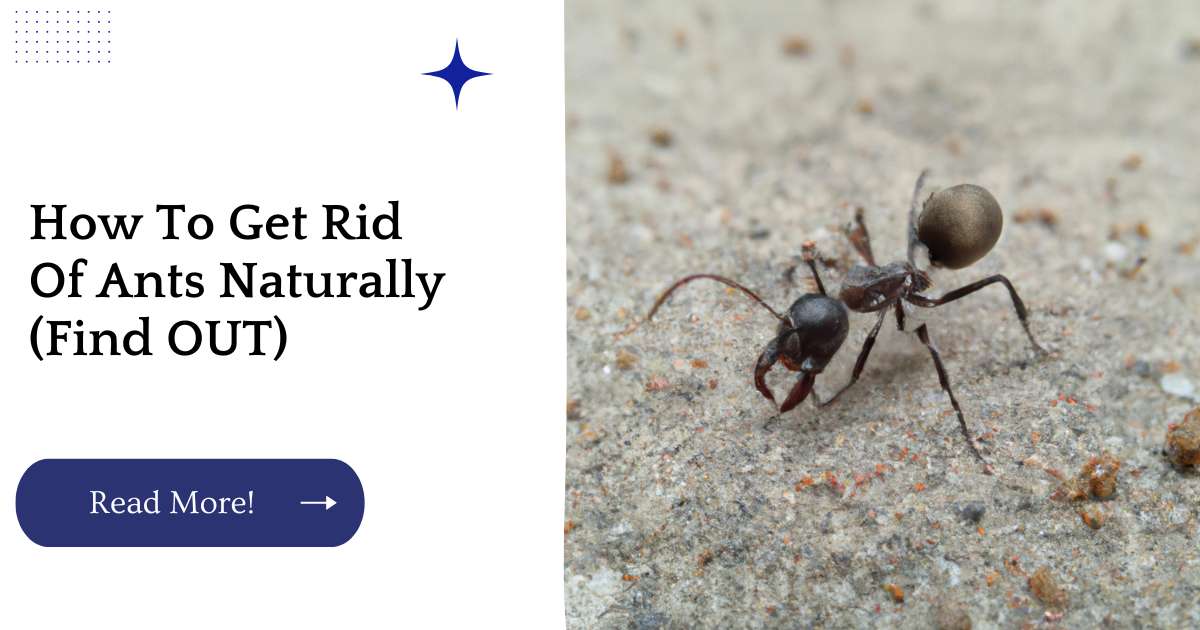Ants are notoriously hard to get rid of. They’re small, but they can make a big mess and cause other problems if you don’t take care of them right away.
That’s why we’ve put together this list of natural ways to get rid of ants without using chemicals or pesticides.
| Takeaways |
|---|
| Using natural methods such as vinegar, cinnamon, or diatomaceous earth can help prevent ant infestations. |
| Sealing entry points and removing food sources can help deter ants from your home. |
| Carpenter ants can cause significant damage to your property and should be dealt with promptly. |
| Boric acid is a secret weapon in the fight against fire ants. |
| Sugar ants can be defeated with patience and persistence using techniques such as baiting and outdoor treatment. |
Sugar and Borax
This is a great solution for ants that are in your kitchen or bathroom.
Mix equal parts sugar and borax and store in an airtight container like a glass jar. To avoid spills, it’s best to use leftover containers from other ingredients like flour or spices.
Sprinkle the mixture where you have seen ants—on window sills or along baseboards—and leave it there for several hours before cleaning up again; repeat as necessary until all of the ants are gone (if they don’t go away).
Borax and Peanut Butter
If you don’t have boric acid on hand, there is an alternative: peanut butter! Ants are attracted to the sweet flavor of the peanut butter and will happily eat it up.
The ants bring the peanut butter back to their colony, which spreads throughout their home. Once the food reaches other areas, it becomes infected with a type of bacteria that kills off all of your ant problem—and it doesn’t hurt anyone else in your home either!
Don’t let ants ruin your outdoor fun! Our guide on how to get rid of ants outside permanently offers natural and effective solutions to keep your yard ant-free and ready for entertaining.
Cinnamon
Cinnamon is an effective ant repellent because it smells like poison to ants, but not to humans. Sprinkle cinnamon around your home; you can also place some cinnamon sticks in your kitchen, which will keep ants away from foodstuffs and other items they might want to ruin.
However, this solution should only be used as a temporary measure until you get the pest problem under control; once rid of all pests, it’s best to remove any cinnamon you’ve put out so that it doesn’t attract new ones.
Coffee Grounds
Ants don’t particularly like coffee grounds, and you can use them to your advantage. Simply mix up some coffee grounds with water in a spray bottle and use it to wipe out the ants on your countertops or other surfaces.
You can also add the mixture to your compost bin if you’re into that sort of thing—the added nutrients will make for a more fertile compost heap.
Sugar ants can be a sticky situation to deal with in your home. Check out our pro tips for getting rid of sugar ants to learn about effective and natural ways to keep these pesky insects from making themselves at home in your kitchen.
Peppermint
Peppermint oil is a natural insect repellent. It works by masking the smell of the ants’ food, so they think you’re full of food and keep on moving.
Ants hate peppermint, which is why many people rub it on their skin to deter them from biting them.
This is also why mint gum (which contains peppermint) won’t make ants go away—they can’t taste it because their small pincers don’t really allow them to chew gum anyway!
To use peppermint oil for this purpose:
- Get some mint leaves or fresh peppermint plant plants (or an extract).
Boil some water in a pot on your stove top, then add in your mint leaves or plants and let them steep for 15 minutes or so until they’ve cooled off enough that you can touch them comfortably with your bare hands (or wear gloves if you prefer).
Or just skip this step if using an extract—just make sure not to ingest too much since it will be concentrated!
| Benefits | Use |
|---|---|
| Repels Ants | Use Peppermint oil to deter ants from entering your home |
| Masks Ants’ Food Smell | Use Peppermint oil to mask the smells of the ants’ food, tricking them into thinking the area is already full of food |
| Non-Toxic | Peppermint oil is a natural solution that does not contain harmful chemicals and pesticides |
| Versatile | Can be used in various forms, such as oil, spray, or planted in your garden to repel ants and other insects |
| Pleasant Aroma | Peppermint oil has a fresh and pleasant aroma, which makes it an appealing choice for repelling ants and other pests |
Bay Leaves
Bay leaves are a great natural ant repellent. Ants don’t like the smell of them and will avoid areas where they’re present. To use bay leaves as an ant repellent, put fresh ones in all the areas where you’ve seen ants.
You can also make a spray by mixing 1 cup of water with 5-10 drops of peppermint essential oil and 10-15 crushed bay leaves. Spray this on countertops and other surfaces where ants may be infesting your home.
Ants invading your home can be frustrating and unhygienic. Our guide on how to get rid of ants in the house provides easy-to-follow tips and tricks that can help you keep these little pests at bay and maintain a tidy home
Lemon Juice
Lemon juice can be used as a natural ant repellent. To make an ant repellent spray with lemon juice, mix 1/2 cup of water with the juice of one lemon and a tablespoon of vegetable oil. Pour the mixture into a spray bottle and shake well before spraying around the areas where you’ve seen ants.
To use this ant repellent, first lightly mist an area where ants are present or have been present in the past week or so, preferably early in morning or late in evening when they are most active. If you only see 1-3 ants at any given time, there’s no need to spray again until you see more ants.
If you do choose to use this method of eradicating your household pest problem, remember that it may take up to 3 weeks for the scent of lemons to fully dissipate—so be patient!
Chalk
Chalk is an excellent natural ant repellent. Chalk is not toxic to humans, dogs and cats, or plants. Although it is not considered one of the most effective methods for getting rid of ants, chalk can be an easy way to keep them out of your home or garden.
Clove Oil And Vinegar
The next natural ant killer is vinegar and clove oil. To be exact, you will need 3 tablespoons of water and 1 teaspoon of clove oil. Mix them together in a spray bottle and spray where the ants are. Repeat this process until they are gone.
Ants in the kitchen can contaminate your food and cause unwanted stress. Explore our pro tips for getting rid of ants in the kitchen and learn how to naturally repel these insects without the use of harmful chemicals or pesticides.
Liquid Detergent Spray
You will need a spray bottle. Fill it with 2 tablespoons of liquid detergent and 1 cup of water.
Spray the ants directly with the detergent mixture. You can also spray around the perimeter of your home to keep ants from entering in the future as they may avoid crossing it on their way back to their nest.
If you find an ant nest, try spraying it directly with this mixture until all the ants are dead or gone from that area. If you can’t get rid of them all at once, keep spraying every few days until there are no more ants left in that area!
Store-Bought Ant Bait Traps
An ant bait trap, or “trap” for short, is a specially designed container that attracts and kills ants by baiting them with food. This can be done by serving up some sugary syrup in the form of a sticky substance or liquid.
The most common types of traps include:
Liquid Ant Bait – A small droplet of sweet poison is placed close enough to an ant trail so that it will attract the unsuspecting worker ants to eat it and carry it back to their colony where they will share it with their fellow colony members until eventually all have been killed off by this deadly substance.
Sticky Surface Traps – These traps take advantage of what makes ants so easy to kill: they’re attracted by sugar!
The easiest way to do this is by placing a very thin layer of honey on top (or just underneath) an upside-down cardboard box with holes cut in one side so as not block any sunlight from reaching inside;
When an individual ant comes along looking for food and finds nothing but honey instead, he’ll try sticking his legs through one hole after another until finally getting stuck inside where he’ll die from starvation before being able to escape again!
Tired of fire ants ruining your lawn and garden? Discover the secret to eradicating these pests in our guide on using boric acid to get rid of fire ants. Say goodbye to fire ant bites and hello to a healthy, vibrant yard with our natural fire ant control methods.
Conclusion
You can get rid of ants naturally with a few simple ingredients. The best part is that these methods are safe for kids and pets to use around the house. If you need help finding other ways to prevent ants from coming back in your home, then contact us today!
Further Reading
Here are some additional resources to help you get rid of ants:
How to Kill Ants: The Ultimate Guide – This comprehensive guide explores everything you need to know about ways to get rid of ants.
How to Get Rid of Ants: 9 Natural Ways to Prevent Ants – This article provides tips and tricks to combat ant infestations in your home with natural and chemical-free options
6 Natural Ways to Get Rid of Ants – Discover six eco-friendly methods for banishing ants from your property.
FAQs
Can ants cause damage to your home?
Yes, ants can cause damage to your home by tunnelling through your property and compromising its structural integrity. Carpenter ants, in particular, can cause significant damage as they burrow through weakened wood.
Why do ants enter our homes?
Ants enter homes in search of food and water, so it is essential to keep your home clean and to store food in air-tight containers.
How can I prevent ants from entering my house?
Seal any cracks or openings in windows and doors, and remove any sources of food or water. Use ant repellents or natural deterrents like vinegar and cinnamon.
Can ants contaminate food?
Yes, ants can contaminate food with bacteria as they move around, which can cause food poisoning.
How do I know if I have an ant infestation?
Ants typically leave a trail of pheromones, and you may notice a steady stream of ants in a specific location. Look for ant nests near your property, and if in doubt, call in a pest control professional.

Hello! I’m Hellen James, and I write about how to keep pests from invading your home. For the last 10 years, I’ve been working in pest control and am excited to share my expertise with you!


